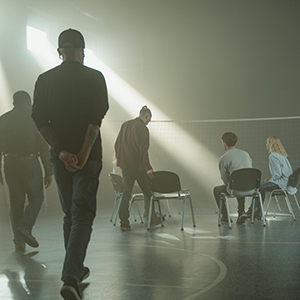Attachment insecurity predicts outcomes in an ACT-CBT group therapy for adults in a physical rehabilitation centre

Accepted: August 23, 2022
Appendix: 130
HTML: 34
All claims expressed in this article are solely those of the authors and do not necessarily represent those of their affiliated organizations, or those of the publisher, the editors and the reviewers. Any product that may be evaluated in this article or claim that may be made by its manufacturer is not guaranteed or endorsed by the publisher.
Authors
Adapting to chronic illness or disability is accompanied by acute and ongoing illness stressors. Psychological factors such as emotional distress and low self-efficacy are common experiences in chronic illness and disability and interfere with adaptation and psychosocial outcomes such as health-related quality of life. Transdiagnostic group psychotherapy may provide a parsimonious approach to psychological treatment in rehabilitation care by targeting shared illness stressors across mixed chronic illnesses and disabilities, and shared processes that maintain psychological symptoms. Attachment theory may explain individual differences in outcomes and help identify individuals at risk of poor health-related quality of life trajectories. Adults (N=109) participated in an 8-week process-based ACT-CBT psychotherapy group at a tertiary care physical rehabilitation centre between 2016 and 2020. Participants completed measures of emotional distress, self-efficacy, health-related quality of life, and attachment at pre- and post-treatment. Multilevel analyses indicated that patients improved on most outcomes at post-treatment. Attachment anxiety at pre-treatment was associated with more positive outcomes. Reliable change indices suggest clinically meaningful change for the majority of participants, but most were not recovered. Results provide proof-of-concept for the transdiagnostic group intervention and suggest that a longer course of treatment may be clinically indicated. Results warrant replication with larger and more diverse samples, and more robust designs.
How to Cite

This work is licensed under a Creative Commons Attribution-NonCommercial 4.0 International License.
PAGEPress has chosen to apply the Creative Commons Attribution NonCommercial 4.0 International License (CC BY-NC 4.0) to all manuscripts to be published.
Similar Articles
- Ana Bela Couto, Eunice Barbosa, Sara Silva, Tiago Bento, Ana Sofia Teixeira, Joào Salgado, Carla Cunha, Client's immersed and distanced speech and therapist's interventions in emotion-focused therapy for depression: an intensive analysis of a case study , Research in Psychotherapy: Psychopathology, Process and Outcome: Vol. 19 No. 2 (2016)
- Jose L. Vilchez, Mental footnotes: knowledge constructivism from logical thinking to personal beliefs and therapy , Research in Psychotherapy: Psychopathology, Process and Outcome: Vol. 19 No. 2 (2016)
- Zelda Gillian Knight, My story in response to the stories of my patients’ experience of the impact of the COVID-19 pandemic: a relational psychoanalytic approach , Research in Psychotherapy: Psychopathology, Process and Outcome: Vol. 23 No. 3 (2020)
- Raffaella Perrella, Nadia Del Villano, Giorgio Caviglia, Referential activity, dissociation, psychopathology and psychotherapy , Research in Psychotherapy: Psychopathology, Process and Outcome: Vol. 19 No. 2 (2016)
- Gabriel Gònzalez, Vanetza E. Quezada, A brief cognitive-behavioral intervention for stress, anxiety and depressive symptoms in dental students , Research in Psychotherapy: Psychopathology, Process and Outcome: Vol. 19 No. 1 (2016): Special issue on Qualitative and Quantitative Research in Child and Adolescent Psychotherapy: part 2
- Zelda G. Knight, The forward edge transference within self-psychology and the activation of inborn capacity through interpretation and internalization , Research in Psychotherapy: Psychopathology, Process and Outcome: Vol. 24 No. 3 (2021)
- Nicola Carone, Ilaria Maria Antonietta Benzi, Laura Muzi, Laura Antonia Lucia Parolin, Andrea Fontana, Problematic internet use in emerging adulthood to escape from maternal helicopter parenting: defensive functioning as a mediating mechanism , Research in Psychotherapy: Psychopathology, Process and Outcome: Vol. 26 No. 3 (2023)
- Vittorio Lingiardi, Nancy McWilliams, Laura Muzi, The contribution of Sidney Blatt's two-polarities model to the Psychodynamic Diagnostic Manual , Research in Psychotherapy: Psychopathology, Process and Outcome: Vol. 20 No. 1 (2017)
- Irene Messina, Giovanna Trimoldi, Shaping psychotherapy trainees’ potential: insights from training program directors , Research in Psychotherapy: Psychopathology, Process and Outcome: Vol. 27 No. 2 (2024)
- Alexander Kriss, Howard Steele, Miriam Steele, Measuring Attachment and Reflective Functioning in Early Adolescence:An Introduction to the Friends and Family Interview , Research in Psychotherapy: Psychopathology, Process and Outcome: Vol. 15 No. 2 (2012)
<< < 8 9 10 11 12 13 14 15 16 17 > >>
You may also start an advanced similarity search for this article.

 https://doi.org/10.4081/ripppo.2022.634
https://doi.org/10.4081/ripppo.2022.634




